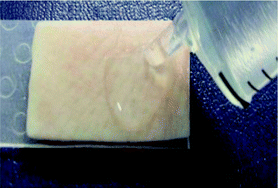Surgical sealants are currently used in conjunction with sutures to reduce the incidence of air or fluid leaks. Although fibrin and collagen sealants can effectively promote wound healing, there are serious concerns about blood-borne virus contamination. Hence, synthetic sealants have been considered a safer alternative. In this work, a new family of synthetic surgical sealant copolymers were derived from poly(glycerol sebacate) (PGS) and lactic acid (LA). The newly developed PGS-co-LA tissue sealants had significantly higher adhesive strength than either fibrin sealants or synthetic PleuraSeal™. Secondly, the addition of lactic acid to PGS significantly improved the cytocompatibility of the materials, compared with pure PGS. Thirdly, the new sealants were able to be pasted in liquid form at ∼45 °C, which subsequently solidified into a soft wax-like patch at body temperature. These properties make the PGS-co-LA materials promising candidates for soft tissue sealants.
You have access to this article
 Please wait while we load your content...
Something went wrong. Try again?
Please wait while we load your content...
Something went wrong. Try again?


 Please wait while we load your content...
Please wait while we load your content...